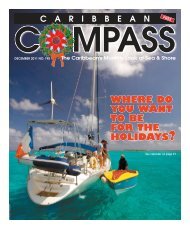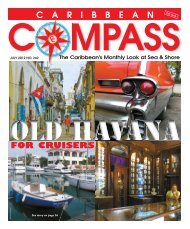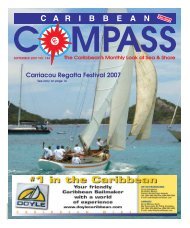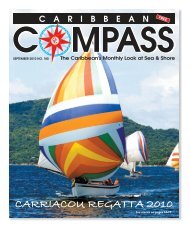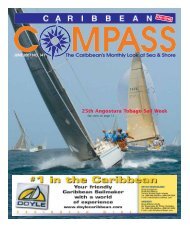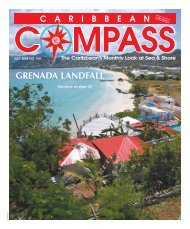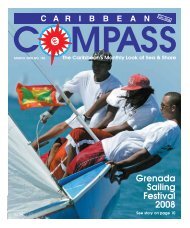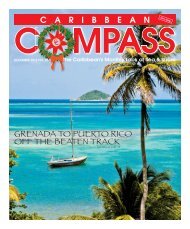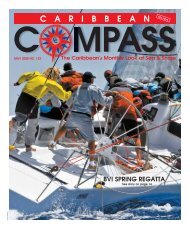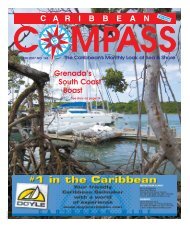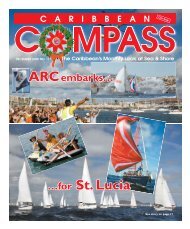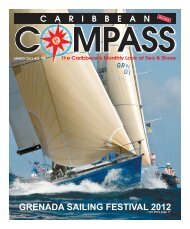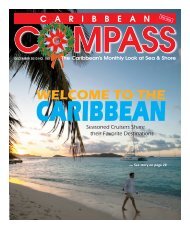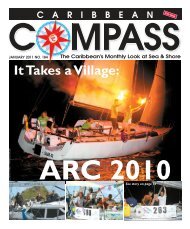Create successful ePaper yourself
Turn your PDF publications into a flip-book with our unique Google optimized e-Paper software.
JANUARY 2008 CARIBBEAN COMPASS PAGE 36<br />
ELAINE OLLIVIERRE 2007 ©<br />
Trevor was over the top with excitement. His mother<br />
had given in to his constant pestering and agreed that<br />
he could spent the New Year school holiday with his<br />
cousin Ernie over there on the windswept Atlantic<br />
coast of Barbados. Usually he had to wait a whole year<br />
for the long summer holiday before seeing Ernie again,<br />
so this was a real treat.<br />
Trevor’s mother had rung Aunt Josefina and what<br />
could she say but “Yes, we’d love to have Trevor. It will<br />
stop Ernie from moping about the house.”<br />
Trevor was waiting for Boxing Day before flying off to<br />
spend the rest of the holiday with Ernie because<br />
Trevor wouldn’t miss Christmas in his own home in<br />
St. Lucia for anything. His mother baked the best<br />
turkey and ham in the entire island along with baked<br />
yams in sugar and butter; souse cold and set like a<br />
jelly from boiled pig trotters and green figs; and there<br />
was always a huge pot of red beans, pig tails and those<br />
chewy little dumplings made from flour and water.<br />
There were other delicious foods too, because a heap<br />
of friends and family came for lunch, bringing along<br />
plates of special treats like a broth of fish, onions and<br />
plantains; fried breadfruit balls; sweet ground-corn<br />
pastels neatly wrapped in banana leaf squares and<br />
tied with string; and always his grandmother’s black<br />
cake soaked in rum. Neighbours exchanged spicy,<br />
crimson sorrel drink and fermented ginger beer, mainly<br />
for the kids, because the adults always helped<br />
themselves to the rich, creamy ponche crema, that<br />
heady mixture of rum, eggs and condensed milk. Oh<br />
yes, Christmas day lunch was too good to miss, even<br />
for Ernie.<br />
So Christmas Day came and went and Trevor was<br />
disappointed that he didn’t get a new bike. (“Well,<br />
young man,” his mother had told him, “we can’t afford<br />
a new bike AND your fare to Barbados, so consider<br />
yourself lucky!”) That shut him up. Trevor quickly<br />
decided that he would rather go to Barbados than<br />
have a new bike; after all, his birthday was coming up<br />
in a couple of months and he would work on Granny.<br />
Boxing Day was bright and sunny and Trevor’s father<br />
drove him to Vigie airport, saw that he got through the<br />
line up at the ticketing counter and then into the departure<br />
hall. He breathed a sigh of relief as he walked back<br />
to the car where he had parked it in the shade of a very<br />
old and very large seagrape tree on the edge of the<br />
sandy beach. Uncle Solly would have the responsibility<br />
PROUDLY SPONSORED BY PETIT ST. VINCENT RESORT<br />
Hello! My name is Do ly and my home is in the sea.<br />
DOLLY’S DEEP SECRETS<br />
by Elaine Ollivierre<br />
In November 2007, approximately 200 scientists met in Auckland, New<br />
Zealand, to discuss the on-going progress of the Census of Marine Life. The census<br />
ends in 2010 so it is important that the scientists agree on how to pull<br />
together their findings for publication in that year.<br />
The census is divided into several Research Projects (described last month).<br />
Researchers from each of the projects made presentations on their work and their<br />
findings so far. New technology means that the scientists can investigate the<br />
oceans more deeply and thoroughly than ever before and they have already made<br />
some astonishing discoveries. Here’s a sample of them.<br />
• More than 5300 new creatures or marine organisms have been found,<br />
including a “hairy” crab and huge (4kg) rock lobsters.<br />
• Sea birds called sooty shearwaters were found to make a round trip of about<br />
70,000 kilometres across the Pacific and back in less than 300 days.<br />
CRUISING KIDS’ CORNER<br />
Cousin Ernie, Here I Come!<br />
Trevor Spends New Year in Barbados<br />
by Lee Kessell<br />
of looking out for Trevor for the next two weeks.<br />
Barbados airport seemed to grow bigger and bigger<br />
every time Trevor landed there and the terminal confused<br />
him with its huge space and luggage conveyors.<br />
He almost went through the wrong door trying to find<br />
his way out and when he made it through the big exit<br />
doors he almost dropped with relief to see Ernie’s grinning<br />
face as he rushed to help him with his bag. Ernie<br />
loved pushing those bags on their own little wheels<br />
and so did Trevor, but he was too tired to fight for the<br />
right to race it like a toboggan across the road to<br />
Solly’s car. Yes, and there was Uncle Solly smiling at<br />
him through the windscreen and, sure enough, he had<br />
on his stingy-brim hat. This was a sure signal that it<br />
would be a mad dash home to the little cottage on its<br />
coral pillars way and over above Sweet Bottom.<br />
Sure enough, when they got out of town and into the<br />
sugarcane fields, Uncle Solly trod on the gas as he<br />
approached those sharp bends in the road and turned<br />
his indicator right when he wanted to go left. The boys<br />
shrieked with happiness from the back seat, bellowing<br />
to Uncle Solly’s back, “Ride ’em, Cowboy! Hi ho, Silver!<br />
Yippee-ki-ay!” and anything else they could think of.<br />
This encouragement made Uncle Solly go even faster<br />
and when they met a donkey pulling a cart coming<br />
around the last bend, they all took to the fields, the<br />
donkey and cart one side, the car on the other. The<br />
donkey was used to pulling the cart into the fields, but<br />
Solly’s old car bumped everyone painfully as it leaped<br />
and bottomed over the ruts and into the cane. But<br />
being a good and sturdy old car, the only damage was<br />
more paint scraped from the doors by the cane stems<br />
and a lump as big as a bird’s egg on Trevor’s forehead.<br />
As they drove into the yard, Uncle Solly warned:<br />
“Better put your cap on, Trevor, or else Josefina will<br />
ask awkward questions if she sees that lump.”<br />
As usual, Uncle Solly had driven around to the<br />
kitchen door instead of parking by the front parlor<br />
causing Josefina to “tut tut” as she hurried the wrong<br />
way. The old dog raised his head from the dust by the<br />
steps and gave Trevor a tired yawn and a wink.<br />
Matilda the donkey gave the boys a suspicious glance<br />
while the black and white goats sneered. But Nyna,<br />
Ernie’s little sister, ran down the kitchen steps and<br />
threw her arms about Trevor’s waist, not that she<br />
liked the way the boys ignored her, but he was her<br />
cousin after all.<br />
Now Uncle Solly had planned to give everyone a big<br />
treat while Trevor was in Barbados. He was taking them<br />
to Oistins on Friday night for the big fish fry. The children<br />
were wild with excitement. Oistins by the fish market<br />
on Friday night was the most popular place in the<br />
whole of Barbados. Tourists came from all the hotels<br />
and the locals liked nothing better than the freshly<br />
caught fish fried or grilled and the heaps of salads and<br />
potatoes stacked high on the plate. Beer for the grownups,<br />
fizzy drinks for the kids, loud music, everyone having<br />
a good time — what more could you ask?<br />
So here they were, that first Friday night down by<br />
the sea at Oistins. Trevor and Ernie grinned when they<br />
heard the beat of the music and smelled the barbecued<br />
fish and they thumped each other just to get rid<br />
of some of the energy. Aunt Josefina chose the stall<br />
(there were lots of individual food stalls under the<br />
great roof of the market extension) as far away from<br />
the loud music as she could get, but the children didn’t<br />
mind because they could take their heaped plates<br />
down to the tables and benches on the edge of the pale<br />
coral sand that fringed the clear, rippling water of the<br />
bay. Fishing boats bobbed at their moorings while the<br />
moon speckled the indigo sea with fists full of diamonds.<br />
Kids ran and shrieked along the beach, running<br />
races and throwing balls to each other. It didn’t<br />
take long for Trevor and Ernie to gulp down their food<br />
and run off to join them, leaving poor Nyna to sit quietly<br />
by her mother and plan a suitable revenge.<br />
When Trevor saw the big breakwater up ahead he<br />
ran off to explore it, Ernie trailing behind. It was farther<br />
than he thought and impossible to walk over as it<br />
was made of those enormous concrete blocks with legs<br />
that lock into each other. Disappointed, the boys<br />
decided to walk around it and this is when they got<br />
lost, ending up in a woody forest. After they had<br />
pushed their way through the brambles, scratching<br />
their legs on the sharp thorns, backyards and little<br />
lanes still blocked their way. Where was the fish market?<br />
Where did Uncle Solly park the car? They walked<br />
and walked, their legs tired and stinging from the<br />
bramble cuts, they were hot and thirsty and frightened.<br />
Would they have to spend the night curled up in<br />
a dark lane? Ernie grumbled that it was all Trevor’s<br />
fault and Trevor called Ernie a spook.<br />
But somehow or other they made it to the main road<br />
and then it wasn’t long before they found the car park<br />
and Uncle Solly’s old car. They also found a very angry<br />
Aunt Josefina. But Uncle Solly, who believed that boys<br />
will be boys, thought that by the look of them they had<br />
been punished enough and told them he would deal<br />
with them later. Tumbled into the car, the children<br />
slept while Josefina sat stiffly by Uncle Solly’s side as<br />
he drove carefully all the way home to the cottage<br />
where the wild Atlantic dashed white waves against<br />
the cliffs in the moonlight.<br />
THE END<br />
• The hottest temperature in the ocean was found on the sea bed of the<br />
Atlantic where hot water at 407 o C was emitted from a hydrothermal vent.<br />
• 20,000 microbes were found in one-litre samples of sea water.<br />
• A school of approximately eight million herring was located off the New<br />
Jersey coast, the biggest ever seen.<br />
• On the negative side, historical research documents the collapse of<br />
many marine species through human exploitation, loss of habitat and pollution.<br />
Other presentations were made on the best ways to document the research and<br />
what would happen when the census was complete. So, was the meeting successful?<br />
Some serious questions came up for discussion.<br />
• What scientific questions about the marine environment will still need<br />
answers after 2010?<br />
• Is there a need for another census after 2010?<br />
• If there is a need, which projects will continue?<br />
• How can we be assured that international cooperation will continue?<br />
• How will a second census be funded?<br />
The research carried out from 2000 to the present has shown how little was<br />
actually known about the oceans and the multitude of creatures which live there.<br />
The first census (2000 – 2010) has only served to show how much is still to be<br />
learnt. With cooperation from governments, international agencies and the scientific<br />
and academic community, it is hoped that support for a second census will<br />
be forthcoming. In the meantime, research continues.<br />
MATHS PUZZLE<br />
By looking at how many new species have been found in particular areas of the<br />
ocean, scientists have estimated that the total number of marine species in the<br />
world might be as many as one and a half million. We already know approximately<br />
230,000 of them. In the seven years of the survey, about 5,320 new<br />
species have been found. If we continue to find new species at the same rate, how<br />
long will it take us to catalogue them all?<br />
— Answer on page 47



